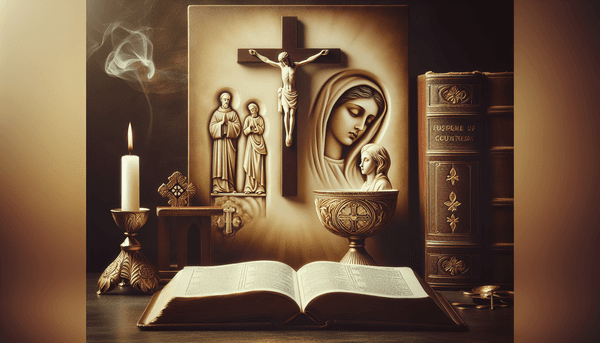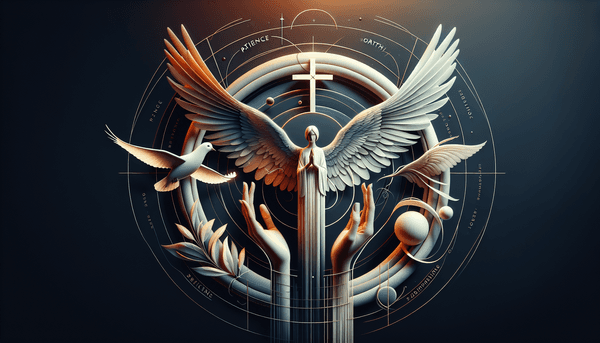Preparing for Mass: Approaching with a Reverent and Open Heart
As followers of Christ, preparing for Mass is an exercise in spiritual alignment, requiring an intentional quieting of our hearts and minds to be fully present with God. Prayer and meditation serve as conduits to this sacred space, allowing us to set aside the distractions of daily life. In the spirit of 1 Peter 1:13, we are called to 'prepare your minds for action; be self-controlled; set your hope fully on the grace to be given you when Jesus Christ is revealed.' This preparation also involves a reflective reading of the Scriptures, particularly those that will be proclaimed during Mass, so that the Word of God may resonate within us. Acknowledging our human frailty, we seek reconciliation with God and others, embodying the humility and repentance echoed in Psalm 51:10, 'Create in me a pure heart, O God, and renew a steadfast spirit within me.' By entering Mass with gratitude and an openness to the Holy Spirit, we cultivate a receptivity that is fertile ground for the seeds of divine grace to flourish.
The Significance of the Eucharist
The Eucharist stands at the heart of Christian worship, embodying the remembrance of Jesus' sacrifice and His command during the Last Supper. As we partake of the bread and wine, transformed into the body and blood of Christ, we are drawn into the mystery of faith, proclaiming the Lord’s death until He comes (1 Corinthians 11:23-26). This sacred act is not merely symbolic but a profound communion with the Divine, uniting us with Christ and the body of believers. Approaching the Eucharist with reverence requires a contrite heart, recognizing the gravity of the sacrament and its transformative power in our lives. Just as Jesus declared, 'I am the bread of life. Whoever comes to me will never go hungry, and whoever believes in me will never be thirsty' (John 6:35), the Eucharist is a source of spiritual sustenance and a testament to the enduring presence of Christ within the Church.
The Role of the Antichrist in End Times
In Christian eschatology, the figure of the Antichrist emerges as a formidable deceiver, one who will perform false miracles and lead many astray. The Antichrist's reign is prophesied to be powerful yet fleeting, ultimately succumbing to divine justice. As believers, it is crucial to discern the truths of our faith, remaining vigilant against the spirit of the Antichrist, which, as 1 John 4:3 warns, is already at work in the world. The narrative of the Antichrist challenges us to hold fast to our convictions and to be steadfast in the face of deception. This figure's eventual downfall, as foretold in 2 Thessalonians 2:8, serves as a reminder that no force of evil can withstand the sovereignty of God. The study of biblical prophecies concerning the Antichrist not only prepares us for the challenges of the end times but also strengthens our resolve to live in the light of Christ's truth.
The Charismatic Movement and Pentecostalism
The Charismatic Movement and Pentecostalism are vibrant expressions of Christianity that emphasize the active role of the Holy Spirit in the lives of believers. With roots tracing back to the day of Pentecost, when the Holy Spirit descended upon the apostles (Acts 2:1-4), these movements encourage a dynamic and personal relationship with God, marked by the gifts of the Spirit, such as speaking in tongues, healing, and prophecy (1 Corinthians 12:4-11). Worship within these traditions is often characterized by exuberance and an expectancy for the miraculous, echoing the biblical call to 'be filled with the Spirit' (Ephesians 5:18). The call to personal conversion and holiness is central, as believers seek to embody the fruits of the Spirit in their daily lives (Galatians 5:22-23). The Charismatic and Pentecostal movements remind us of the transformative power of the Holy Spirit and the potential for renewal in every aspect of our worship and witness.
The Dual Nature of Jesus: Fully Human and Fully Divine
The mystery of the Incarnation lies at the core of Christian faith, professing Jesus Christ as both fully human and fully divine. This dual nature is encapsulated in the profound declaration of John 1:14, 'The Word became flesh and made his dwelling among us.' As the Son of God, Jesus embodied divine nature, yet He also shared in the human experience, enduring temptation and suffering without sin (Hebrews 4:15). In Philippians 2:6-8, we find a compelling portrait of Christ's humility and His choice to embrace mortality for the sake of our salvation. This theological cornerstone invites believers to grapple with the complexities of Jesus' identity and to find solace in His relatable humanity and awe in His divine majesty. Recognizing Jesus as both our compassionate intercessor and sovereign Lord enriches our spiritual understanding and deepens our relationship with Him.
FAQ
Q: How can one approach Mass with a reverent and open heart?
A: Approaching Mass with a reverent and open heart involves prayer and meditation to quiet worldly distractions, reflecting on the significance of the Eucharist and the sacrifice of Jesus, cultivating humility and gratitude, and being open to the Holy Spirit. Additionally, participating in the sacrament of reconciliation and seeking to reconcile with others can help prepare your heart to receive the grace and blessings of the Mass.
Q: What is the significance of the Eucharist in approaching Mass with reverence?
A: The Eucharist is significant in approaching Mass with reverence as it is a sacred act of partaking in the body and blood of Jesus Christ, a time to remember and honor His sacrifice, and to enter into communion with Him and fellow believers. It is central to the Christian faith and reflects the command of Jesus during the Last Supper to 'do this in remembrance of me' (1 Corinthians 11:24).
Q: What are some ways to prepare for Mass?
A: To prepare for Mass, spend time in prayer and reflection, meditate on the Scriptures that will be shared, consider areas of your life that may require forgiveness or reconciliation, and approach the Mass with a humble and repentant spirit. This preparation aligns your heart and mind with God's presence and prepares you for the worship experience.
Q: How can participating in the sacrament of reconciliation help in preparing for Mass?
A: Participating in the sacrament of reconciliation helps in preparing for Mass by allowing individuals to confess their sins, seek forgiveness, and restore their relationship with God. This act of repentance cleanses the heart and fosters a humble disposition, making one more receptive to the grace and blessings of the Mass.






